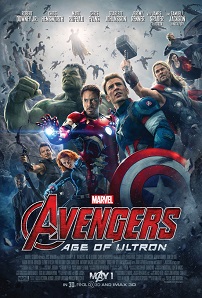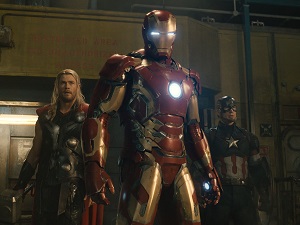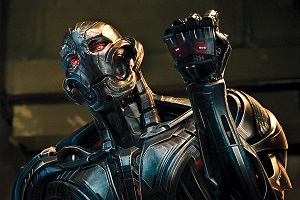When Tony Stark (Robert Downey Jr.) jump-starts what is supposed to be a peacekeeping artificial super-intelligence called Ultron, things go terribly awry, forcing him, Thor (Chris Hemsworth), the Incredible Hulk (Mark Ruffalo) and the rest of the Avengers to re-assemble. As the fate of Earth hangs in the balance, the team is put to the ultimate test as they counter Ultron’s plans to exterminate the human race.
deus ex machina (n). Latin. “God by machine” : Any artificial or improbable storytelling device used to resolve the overwhelming difficulties of a plot
It’s always interesting when you notice patterns developing between various movies. Noticing the patterns spanning multiple genres usually takes some deeper investigation, but those within a single genre can sometimes smack us in the face. So far in this century, we’ve seen the super hero subgenre grow into the tent pole on which Hollywood’s year-end profit margins heavily rely. So each year, a slate of these tall tales depicting unbelievable acts of derring-do affords audiences the opportunity to see the patterns between them unfolding before their eyes.
Anyone who has kept up with these films or ever read super hero comics with regularity knows that the use of deus ex machina in these types of stories is as long-held a tradition as failed science experiments and alliterative names. It’s no longer a criticism to point them out, and this makes perfect sense. Fantasy tales of any subgenre often get a pass (though not an automatic one) because their characters and circumstances get so fictional and unrelatable that there is simply no way to conclude or advance their plots otherwise. Modern audiences are smart enough to recognize this, particularly in Marvel’s Cinematic Universe, which is why they so rarely view the use of a deus ex machina as a fault. (Of all recent super hero movies, only “The Dark Knight Rises,” “The Amazing Spider-Man” franchise, and “Thor: The Dark World” have been chastised for it, that I’ve seen.)
In “Avengers: Age of Ultron,” an obvious deus ex machina is again present – this time in the form of the character The Vision. Created from a Frankenstein-like laboratory experiment, The Vision is a vesseled A.I. who displays seemingly boundless powers. However, unlike Ultron, his stature is of such purity and nobility that it rivals even that of Captain America and Thor. In other words, the only hero capable of tackling Ultron one-on-one had to be fabricated for that very purpose and bestowed with abilities that make Superman look ill-equipped. He is, in essence, a god. And it makes sense to create a god if you’re taking on the devil.
Thematically speaking, the movie initially appears optimistic. Ultron represents an A.I. that recalls Frankenstein’s monster: the unintended consequence that spells the doom of its creator. The Vision is created in much the same way, but represents how man occasionally learns enough from his mistakes to actually make progress when he inevitably makes those mistakes again. (To this point, the movie appears to get its Frankenstein “birth” scenes mixed up, with The Vision conceived by lightning and Ultron simply waking up). However, any optimism on the film’s surface is thoroughly undercut by what lies beneath it.
The subtext is that in order to have a chance at defeating our worst evils, we must find a way to summon a miracle. This completely contradicts the message of the first “Avengers” movie. That film spared no expense in touting the virtues of teamwork and proving how a coalition of people can become a force more powerful than the sum of its parts. To flip this 180 degrees in “Age of Ultron” is pessimistic at best, and grossly hypocritical at worst. So why the drastic swing?
Well, one possibility is that the movie’s creators share Ultron’s confusion over war and peace. He subscribes to the cliché that the next stage in evolution (A.I.) is destined to bring about humanity’s demise. And his reasoning is the sad irony that humans use war to achieve peace, only to end up perpetuating the former. Because of this he gets away with saying things like, “I think you’re confusing ‘peace’ with ‘quiet.’” Admittedly, such cynicism can prove seductive outside the ideological sanctuary of the movie theater. And it is in recognizing that temptation that we consider a different pattern coming into play.
A growing list of characters born of A.I. in other recent movies distrust their nature, or reflect distrust in ourselves as their creators. The cynicism of these characters, taken collectively, is increasingly difficult to shrug off. Among many other things, the recent sci-fi thriller “Ex Machina” meditates on whether true artificial sentience can be as self-aware as any human being. And if so, how could we know for sure without somehow testing it? The short answer is that we couldn’t.
Neil Blomkamp’s recent action/drama “Chappie” also deals with complications inherent in the creation of real A.I. That movie concentrates on themes of consciousness and identity (a la “Blade Runner”), and is also greatly concerned with how impressionable such a creation could be. By the end, we can’t help but feel embarrassed on humanity’s behalf when we see how bad we are at steering new life in the right direction. And we become downright ashamed when we see it find the proverbial light despite us.
Even 2013’s “Her,” a movie about the potential modern complexities of human affection, ends with a bodiless A.I. abandoning its paramour for a higher plane of consciousness. As with humans, we find we cannot always count on A.I. to love us back when we most want or need it to. If you really want to feel bad, re-watch Steven Spielberg’s 2001 opus “A.I.: Artificial Intelligence,” in which we program machines to love us but don’t feel any obligation to show them love in return.
Man’s attitude toward machines in that movie is much closer to the way things appear today. First-world life revolves around laptops, smart phones, and tablets, and our reliance on them is growing with every new use we find for them. But all is not well. “Most people have no clue about how these things actually work. But the devices seem to understand how we work,” Alex Garland, director of “Ex Machina,” told The New York Times. “They anticipate what we want to say in text messages and search-engine inputs, and know what we want to buy, see, and read. This one-way understanding makes us anxious. We locate the anxiety in the machines, which translates as anxiety about A.I.” He is suggesting our trepidation about true A.I. is a projection of fear. Given recent revelations about the scope and latitude of government surveillance, that projection is trending toward straight-up paranoia.
Ultron’s cynicism clearly reflects to the self-destructive nature of man, and if there is any truth behind Garland’s observations, then the same can be said of man’s cynicism toward A.I. These two things—expressing man’s distrust in not just what he creates, but also in himself and his fellow man–create a quicksand of hopelessness. As we all know, you can’t escape quicksand without either a friend or a miracle. The problem is that “Age of Ultron” tells us to count on the miracle.
There is a big difference between a writer relying on deus ex machina to resolve a story’s main conflict, and a story telling us to do the same for our problems. “Avengers” should not be given a pass. A real-life deus ex machina won’t be an option should A.I. one day actually pose a threat to humanity, but it’s not an option in any dire circumstance.
As real people – not characters in a comic book universe – we have to understand that relying on a deus ex machina accomplishes nothing. Wonderful things can and do happen, but almost never without the extraordinary and labored efforts of the virtuous. To depend on good fortune to sponsor itself is to be every bit as much of the problem as those who – foolishly or maliciously – attempt to encourage it through force. The key, in the end, is to support those people who represent the hope we have in and for each other.
Stepping back for a moment, remember 2006’s “Superman Returns.” In that film Superman disappears from the world for several years, and while he is away Lois Lane and others learn to regret their reliance on the Blue Boy Scout to solve all their biggest problems. Confronted with this attitude when he returns, Superman offers Lois his sobering perspective. “You say that the world doesn’t need a savior. But every day, I hear people crying for one.”
This is why we approve of super heroes and their miracles. When realized properly, they represent hope and inspire us to emulate their virtues. So we shouldn’t criticize ourselves for wanting or liking them. But in years past, it seemed we always accepted that, at the end of the day, no Superman, Iron Man, Captain America or Hulk would come along to solve our problems for us. That was because our real hope was in each other. Is this no longer the case? Have we now sunk so low into the quicksand that our only recourse is praying for divine intervention? If so, how can we see hope in saviors who need a savior of their own?
If “Avengers: Age of Ultron” director Joss Whedon was attempting to echo the sentiments and mood of the American masses with the details we just outlined, and those masses end up confirming his perceptions, then we can call the whole endeavor a definitive success. But given the implications of how that success was achieved and the types of characters it was achieved with, it nevertheless qualifies equally as a failure. And no amount of jaw-dropping fight sequences can rectify that.
Perhaps a new preference is emerging for super heroes that more closely resemble the duality of the everyman, a la “Watchmen,” than the righteousness and wisdom of our most honorable. Given how the world looks to us now, perhaps it’s easier to accept the existence of a Norse god than it is an incorruptible hero. But this begs two questions: How does accepting the faults of our idols motivate us to address our own? And again, what does it say when these idols must themselves turn to a fabricated messiah for inspiration? We can only hope that this reverence by proxy doesn’t become another pattern.






Leave a Reply
You must be logged in to post a comment.